Jupiter Green Investment Trust (LON:JGC) is continuing to benefit from the greater public interest in green issues, which is driving demand growth for companies delivering solutions to environmental challenges. Manager Charlie Thomas and his team run a globally diversified portfolio of c 60 companies, invested across a wide variety of areas, broadly grouped into themes of resource efficiency, demographics and infrastructure. The growing maturity of the investment universe is leading to a larger number of companies paying attractive dividends, enabling JGC to enhance its own dividend policy, with a higher yield (now c 1.3%, from c 0.7%) and semi-annual payouts. As the highest-yielding, closed-ended ‘green’ equity fund, JGC could see greater demand for its shares, which could help to narrow the currently wider-than-average discount to NAV.
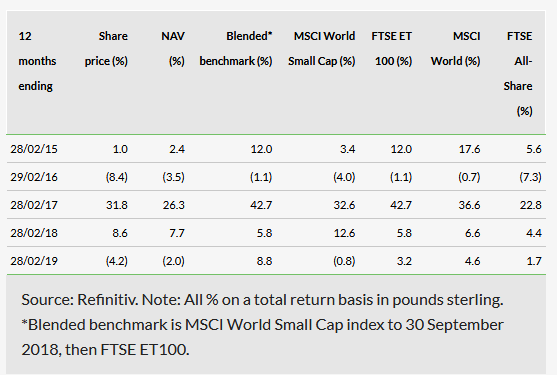
The market opportunity
In recent years there has been much greater public focus on environmental issues, from the need to reduce plastic waste to how we address climate change via a shift to zero-carbon energy sources. This has fed into an expanded investment universe for JGC, as larger companies transition their business models to meet environmental challenges, as well as leading to greater demand for the products and services of companies for which this has always been a core focus. This should underpin future growth in the sector, although investors must remain mindful of valuations.
Why consider investing in Jupiter Green IT?
Enhanced dividend policy makes JGC the highest-yielding fund of its type.
Higher demand for sustainable technologies drives underlying company growth.
Strong medium-term absolute returns but wider-than-average discount to NAV.
JGC’s small size opens up opportunities in IPOs and smaller companies where larger funds would be unable to make meaningful investments.
Well-established team at fund house that pioneered ‘green’ investing in the UK.
Board made up of leading experts in sustainability and sustainable investing.
Higher dividends could help close widening discount
JGC’s current 5.8% share price discount to cum-income NAV (at 13 March 2019) is wider than the average discounts over one, three and five years, which range from 4.4% to 5.5%. The discount widened from a 0.9% premium in October 2018 as JGC’s share price fell amid market volatility, and has remained wider than the medium-term average as the NAV has outperformed the recovering share price. The introduction of a higher, semi-annual dividend may help boost demand for JGC’s shares.
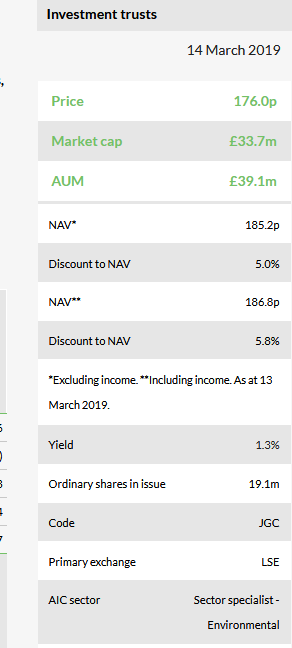
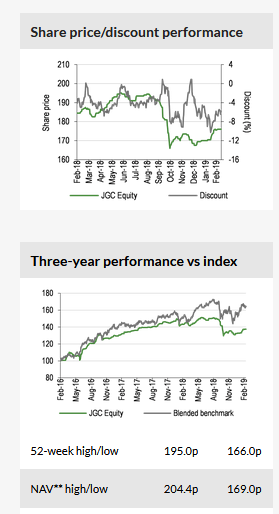
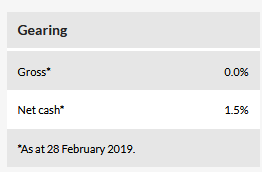

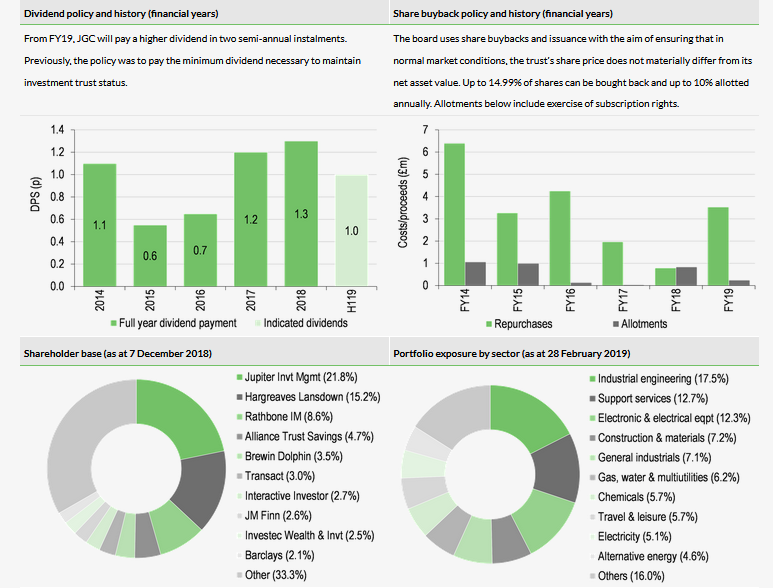
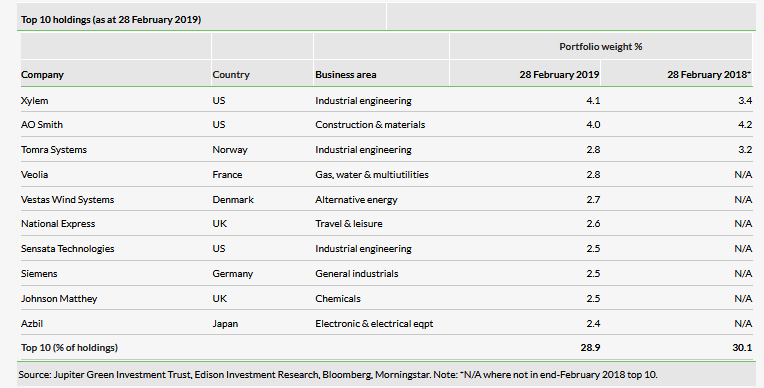
Fund profile: Greater income focus for green specialist
Jupiter Green Investment Trust (JGC) was launched in 2006 by Jupiter Asset Management, which pioneered ‘green’ investment in the UK with the launch of the open-ended Jupiter Ecology Fund in 1986. JGC was a successor to Jupiter Global Green Investment Trust, itself set up in 2001 as a follow-on vehicle for the Jupiter International Green Investment Trust, which began life in 1989. It is managed by Charlie Thomas, head of strategy, environment and sustainability at Jupiter, assisted by other members of the environment and sustainability team, including analyst Jon Wallace.
JGC has a diversified global portfolio of c 60 companies that are providing solutions (often technologically based) to environmental challenges. It has recently amended its investment objective to focus on income as well as capital growth, reflecting the greater maturity of (and therefore dividend payments from) the companies in its investment universe. It has also adopted a new performance benchmark, the FTSE Environmental Technology 100 (ET100) index, which its board and managers see as providing a better reference point than the previous MSCI World Small Cap benchmark, which has no specific environmental focus. Prior to 2010 (when the MSCI index was adopted), JGC’s portfolio was managed in two parts, with US stock-picking outsourced to Winslow Asset Management, and the benchmark was a composite of the FTSE Global Small Cap ex-US index and the Russell 2000, in proportions equal to the share of the portfolio managed by Jupiter and Winslow, respectively. The trust is a member of the Association of Investment Companies’ Sector Specialist: Environmental sector.
Because of its small size (net assets of c £40m), JGC is able to make meaningful investments in smaller companies (including at the initial public offering [IPO] stage). It may also invest up to 5% of its assets at the time of investment in unlisted companies. Gearing is available via a £3m flexible loan (although this has not historically been used), and JGC may also use derivatives and short positions for risk management purposes.
The fund managers: Charlie Thomas and team
The managers’ view: Waste and energy remain high on agenda
Thomas says the increased global awareness of the need to respond to environmental challenges is driving investment opportunities in a multitude of areas, giving the team a greater diversity of companies to choose from. He gives the example of Eaton (NYSE:ETN), an established US industrial company that has a diversified portfolio but an underlying thematic focus on energy efficiency, through products and services in areas such as metering and power management. Eaton is a reasonably large company (market capitalisation of c $34bn), and typifies the development of JGC’s opportunity set, which in turn is feeding into the trust’s ability and desire to pay higher dividends. Thomas says that in the past, when the investment universe was lower-yielding and less mature, JGC had more of a focus on capital growth. ‘But there have always been companies with a yield, and their yield is becoming more prominent as they mature and have capacity to deliver more income,’ he adds.
In terms of investment themes, Thomas says waste management (particularly plastic, but also other areas such as food waste) continues to command a lot of attention. The global agenda is quickly accelerating; having previously imported c 60% of G7 countries’ plastic waste, China has banned such imports, and other Asian countries such as Thailand and Malaysia are following suit. ‘Countries need to start dealing with their own waste,’ says Thomas, adding that policies such as China’s import ban are significant for the waste sector globally, and the increased focus on recycling is advantageous for holdings in the JGC portfolio, such as ‘reverse vending machine’ maker Tomra Systems, and household and industrial waste management firm Casella Waste Systems. Thomas points out that the EU (including the UK, at least for the present) has ambitions towards the ‘circular economy’, including a target of 90% collection and recycling of plastic bottles by 2030, but that one of the barriers to this is a lack of alignment in waste management, with major divergences in how different municipalities collect, sort and dispose of waste. Both Tomra and Casella offer advanced waste-sorting solutions that can help increase recycling rates, which means demand for their services is strong; however, Thomas cautions that investors should be mindful of whether valuations for these companies already reflect the sizeable opportunity.
While the public focus on plastic waste – exemplified by a consumer campaign to post back Walkers’ non-recyclable crisp packets to the company – can translate into real change (Walkers has said its packaging will be fully recyclable by 2022), Thomas says it is important to understand the context of plastic use, and to focus on better ways of reducing or replacing, as well as recycling it. ‘It is a balance – plastic extends shelf life, so it reduces food waste, and it is a lightweight material, so it cuts the cost and environmental impact of distribution,’ he argues. ‘You have to think about the long-term implications of the shift from plastic to non-plastic.’
Climate change also remains an important theme, both in environmental and investment terms. Thomas says that the increased take-up of renewable energy is driving a need for more investment in the distribution and storage of power from such sources, as well as a focus on energy efficiency to reduce overall power consumption. ‘We are looking at how core technologies interact with each other, such as Siemens’ focus on how to deploy sustainably generated power within grids, as well as helping to generate the power through its wind turbine division,’ he explains.
Looking ahead, key short- to medium-term macro issues for the trust include the resolution (or not) of trade tensions between the US and China, and how much the Chinese economy is slowing. While slower economic growth in China is not directly an environmental issue, Thomas points out that it would have a broad impact on the industrial sector (for which automation in China has been a key source of growth), and industrial companies ‘are the heartland of environmental solutions’. However, the manager adds that a more important question is whether factors such as slower growth in China and the impact of trade tariffs are short-term issues, or if they disturb the long-term opportunity for JGC. ‘We think they do not – in the long term, the right company with the right product or service and the right calibre of management will deliver,’ he concludes.
Given recent market volatility, the team is not currently considering making its first use of JGC’s gearing facility – ‘in this market, it could be quite treacherous,’ says Thomas. However, the portfolio is effectively fully invested, with a low net cash position of c 1.5%.
Asset allocation
Investment process: Seeking sustainable solutions
JGC’s management team is part of the wider environmental and sustainability team at Jupiter, which sees its investment universe as comprising three interlinked areas – resource efficiency, infrastructure, and demographics – where environmental and economic issues meet (see Exhibit 2). Within these areas, JGC focuses particularly on companies that are providing lasting solutions to environmental challenges.
The team classifies these companies into two types: transitional and transformational. JGC manager Charlie Thomas illustrates the distinction using the example of the challenge of plastic waste: transitional companies would be those facilitating the increased reuse or recycling of plastics (such as Tomra Systems, with its reverse vending machines), while transformational companies would be those providing environmentally sustainable yet commercially viable alternatives to plastics, allowing plastic use to be reduced or eliminated. As the need for solutions to environmental challenges has become more widely accepted, the JGC team says its global investable universe has expanded to c 1,200 companies, from only c 100 at the trust’s launch in 2006.
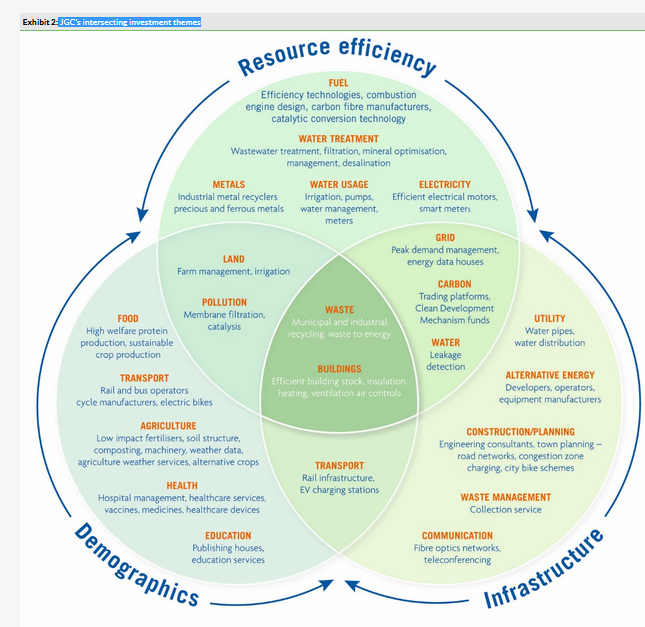
Meeting c 200–300 companies each year allows the team to monitor developments in the environmental space; they also use financial screens, keep up with technological developments, leverage broker networks and attend industry conferences, to assist them in identifying investable themes and trends. These inputs feed into a list of potential investee companies, all of which must have appropriate balance sheets and cash flows, high-quality, experienced management teams, and proven technologies. The JGC team rigorously analyses these companies using a range of financial and valuation metrics, as well as focusing on end-market dynamics, sustainability and governance, and political and regulatory risks. The aim is to arrive at a relatively focused list of well-run, innovative companies with the ability to generate sustainable profits and return on equity. While yield is not a primary consideration, the managers note that as their investment universe has matured, it has become increasingly possible to find companies generating a reliable dividend stream, which has been an important factor in the JGC board’s decision to pay a higher, more regular income to investors.
New positions typically come into the portfolio at less than 1% of NAV, and rarely exceed 5% over the life of the holding. Positions will be increased as the team’s investment thesis is validated, and may be sold if valuations look overstretched, or if a change in the outlook for the business or industry area calls the original thesis into question. Portfolio turnover is typically low, at less than 15% a year, implying an average holding period of around seven years.
Current portfolio positioning
At end-H119 (30 September 2018, the latest date at which the full portfolio listing is available), there were 66 holdings in JGC’s portfolio, an increase from 62 at end-FY18 (31 March). The top 10 stocks at 28 February 2019 made up 28.9% of the total, broadly unchanged on 30.1% a year earlier, although only three of the names were common to the top 10 in both periods (Exhibit 1).
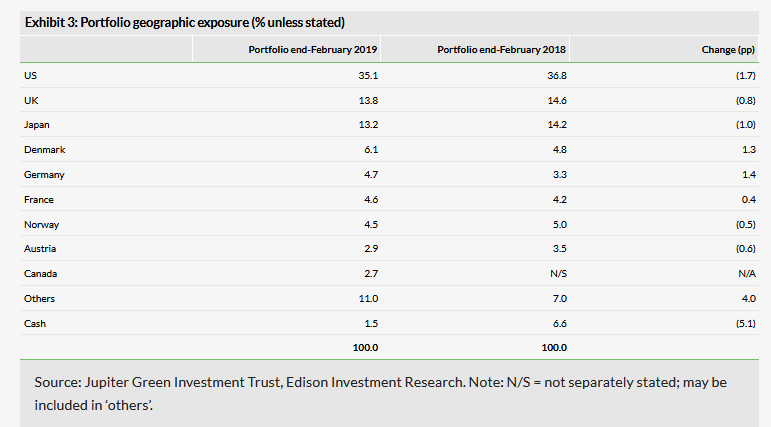
While the US makes up more than half of the global stock market capitalisation, JGC’s exposure to the country tends to be lower, as the managers say the investment universe of companies providing environmental solutions is relatively less prevalent there than in other regions. The portfolio weighting in both the US and UK fell in the 12 months to 28 February 2019 (Exhibit 3), while some other areas saw increases.
In sector terms (Exhibit 4), there is a natural bias towards industrial companies (a group that includes industrial engineering, electronic and electrical equipment, support services, general industrials, and construction & materials, which together made up 55.9% of the portfolio at 28 February 2019). Recent new purchases in this area include Siemens, which JGC team member Jon Wallace says has entered the trust’s investment universe as a result of growth in its environmental division, with energy efficiency solutions and renewable energy now accounting for c 50% of revenues. In terms of broad sustainability themes (including its health and environmental services businesses), the share of revenues rises to around two-thirds. Wallace says large corporations such as Siemens (which merged its wind turbine business with Spain’s Gamesa in 2016) and Ørsted (formerly DONG Energy, itself formerly Danish Oil & Natural Gas) see renewable energy as an area of long-term growth, and are angling their business models to capture this opportunity. Also recently added to the portfolio is Knorr-Bremse, another German engineering company, which is a world leader in braking systems for rail and trucks. The stock was bought at its IPO in October 2018, since when its share price has risen by c 6% in euro terms.
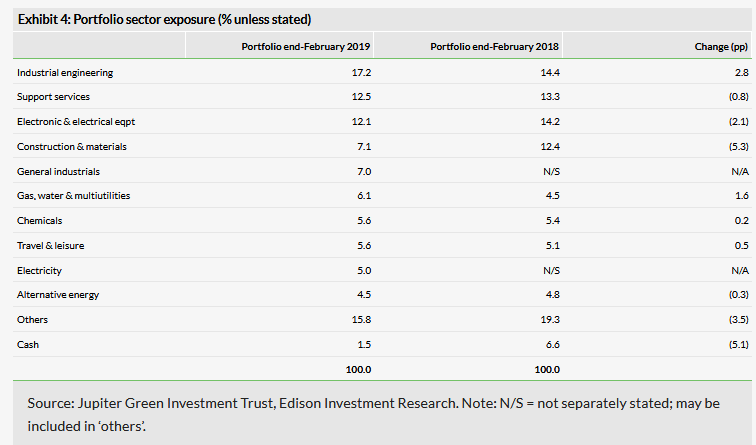
The trust has recently made investments in several funds that pay attractive yields, including US-based NextEra Energy (NYSE:NEE) Partners (which owns wind and solar power assets and has a 4% yield), Hannon Armstrong Sustainable Infrastructure Capital (a US real estate investment trust with a c 5% yield) and Ireland-focused Greencoat Renewables. However, the managers are keen to stress that they are also seeing good yields from a number of conventional companies, such as ferry operator Fjord1 (yielding c 6%) and salmon farmer SalMar (c 5%), both listed in Norway.
Recent sales include German energy utility Innogy and US food company United Natural Foods, both as a result of planned corporate actions that would have diluted their environmental credentials. The holding in power storage specialist Varta was reduced and waste management firm Augean sold after strong performance meant their valuations had begun to look extended, while JGC exited from US medical waste company Stericycle (NASDAQ:SRCL) and UK-listed transport operator FirstGroup, which the managers felt both faced structural challenges and offered little or no yield.
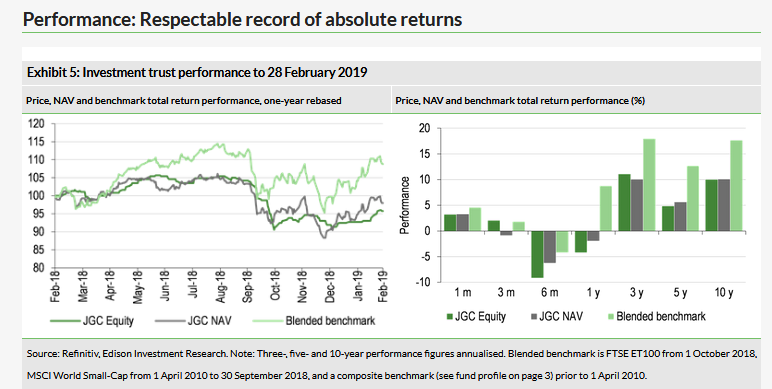
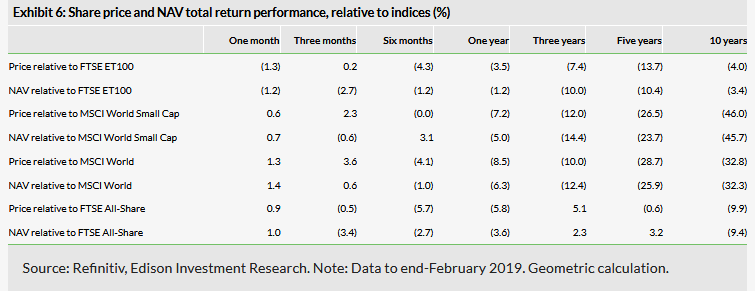
Having experienced price and NAV declines in the stock market volatility of the last quarter of 2018, JGC has begun the year positively, buoyed by strong gains at a number of its larger holdings. However, the trust has lagged its blended benchmark (see note to Exhibit 5), partly owing to its relative lack of exposure to the US, which has performed strongly. In the six months to 30 September 2018, stocks including Tomra Systems, Clean Harbors, Xylem, and recent purchases SalMar and Brambles contributed positively to performance, while AO Smith detracted. So far in H219 (year ending 31 March), most of the trust’s top 10 holdings have seen significant share price gains in local currency terms, particularly since the start of the calendar year, with double-digit gains for companies including Johnson Matthey (LON:JMAT), Sensata Technologies, Brambles and National Express.
Looking over the longer term, JGC has produced creditable share price and NAV total returns of c 10–11% a year over three and 10 years, although performance over five years has been relatively weaker, with returns of c 5% pa. As shown in Exhibit 6, performance relative to a range of indices has been mixed, with JGC lagging broad-based global indices (whose performance has arguably been driven largely by US technology stocks) over periods of one year and longer in sterling terms, but outperforming in recent months.
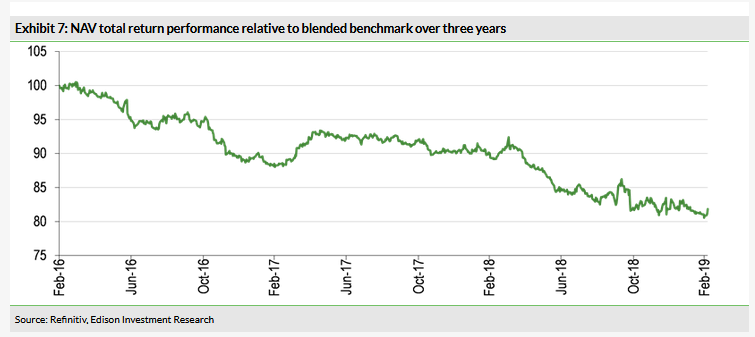
Discount: Market volatility sees more volatile discount
At 13 March 2019, JGC’s shares traded at a 5.8% discount to cum-income NAV. This was wider than the average discounts over one, three and five years (4.4%, 5.5% and 4.4%, respectively), but narrower than the 10-year average of 8.0%. Having traded in a relatively narrow range between par and a 6% discount from late 2016, discount volatility has picked up in the past six months (in line with the increase in stock market volatility), with the shares trading in a range broadly between a premium of c 1% and a discount of c 10%. In line with the board’s policy of ensuring the share price and NAV do not materially diverge, the number and magnitude of share buybacks has also increased in recent months.
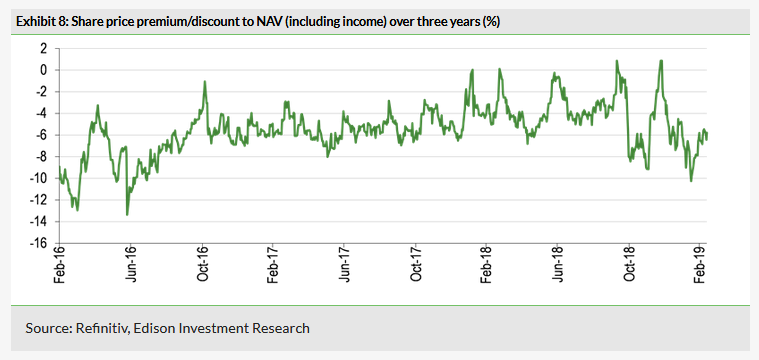
Capital structure and fees
Structured as a conventional investment trust with one class of share, JGC had 19.1m shares in issue at 13 March 2019. An annual subscription rights opportunity gives investors the option to purchase one new share for each 10 shares held on 31 March each year, at a price equivalent to the undiluted NAV per share at the previous 31 March year-end. In 2018, 130,998 new shares were issued at 184.33p following the exercise of subscription rights. However, given JGC’s share price (at 13 March 2019) is currently c 8% lower than the 191.31p NAV at 31 March 2018, it seems unlikely that this year’s subscription opportunity will be taken up by investors, unless the shares rally significantly in the short term. JGC has a premium/discount management programme, under which shares may be issued or repurchased to ensure that the share price and NAV do not materially diverge from one another. So far in FY19, 1.97m shares have been bought back (9.4% of the total, at a cost of £3.5m), the great majority of them since November 2018. Gearing is permitted up to 25% of net assets, and is available through the trust’s £3m revolving credit facility with Scotiabank (equivalent to 8.4% of net assets at 13 March 2019). However, this has not been used to date, and JGC currently has a small (1.5%) net cash position.
With effect from 1 June 2018, JGC has reduced the annual management fee it pays to Jupiter, from a flat 0.75% of net assets, to 0.70% of net assets up to £150m, 0.60% between £150m and £250m, and 0.50% above £250m. This brings JGC’s management fees more into line with those of the open-ended Jupiter Ecology Fund (institutional share class). The performance fee structure has also been removed with effect from 1 April 2018. Management fees and financing costs are now charged 75% to capital and 25% to revenue (previously 90% and 10%). Ongoing charges were 1.41% at end-H119 (with the new 0.70% management fee in place for four of the six months), down from 1.48% at end-FY18.
Dividend policy and record
JGC has changed its dividend policy with effect from FY19, in light of the growing element of its investment universe that is providing a sustainable stream of dividend income. Previously, dividends were paid in line with the requirement for investment trusts to retain no more than 15% of their net income. Under the new policy, two dividends will be paid each year, with the payout in FY19 anticipated to be roughly twice the 1.3p paid in FY18. The first interim dividend of 1.0p for FY19 was declared at the beginning of March, and was fully covered by the net revenue return per share of 1.28p in H119. Following approval at the 2018 AGM, dividends may now be financed from a combination of current-year income and available capital and revenue reserves, although JGC’s managers say their intention is that the dividend will be fully covered by income over a market cycle. Based on the current share price and the last 12 months’ dividends (including the FY18 and H119 payouts), JGC yields 1.3%, which is significantly above the average of its open- and closed-ended peers (see Exhibit 9).
Peer group comparison
JGC is a member of the AIC Sector Specialist: Environmental sector, a small peer group of three funds that invest broadly across environmental sectors. Below in Exhibit 9, we also include two open-ended funds managed by the Jupiter team. JGC is the smallest of the three closed-ended funds. Its one-year NAV total returns are below those of the closed-ended peers but a little better than its Jupiter stablemates’ performance. Over three years JGC ranks second of the three closed-end funds and ahead of the open-ended funds, with a broadly similar picture over 10 years; over five years its NAV total returns are below the average of both the closed- and open-ended funds. JGC’s ongoing charges are the second-lowest across both groups of funds, with no performance fee, and it has the highest dividend yield, following the change in its dividend policy with effect from FY19. The fund is currently ungeared. JGC’s shares trade at a modest discount to NAV, in contrast with its closed-ended peers, one of which is trading at a small premium, while the other is at a discount of more than 20%.
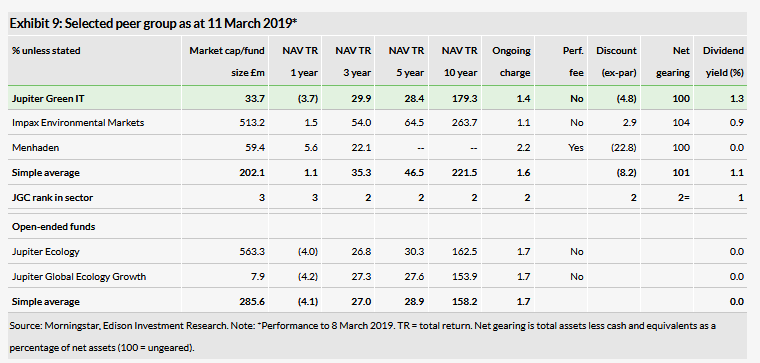
The board
There are four directors on JGC’s board, all non-executive and independent of the manager. The number of directors was increased from three, with the appointment in December 2018 of Jaz Bains, group risk and investment director at Renewables Energy Systems, which manages operations for UK-listed renewable energy infrastructure fund The Renewables Infrastructure Group. JGC’s managers say Bains’s skills are highly complementary to their own, and will add expertise on the investment side. The other directors are Michael Naylor (appointed to the board in 2009, and chairman since 2015), whose background is as a private equity investor in sustainable assets; Dame Polly Courtice (appointed at JGC’s launch in 2016), a leading academic and director of the University of Cambridge Institute for Sustainability Leadership (CISL); and Simon Baker (appointed in 2015), former head of Jupiter’s green investment department from 2002 to 2006.